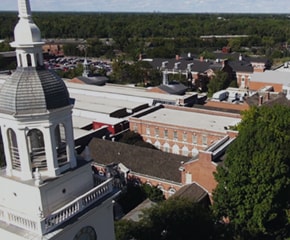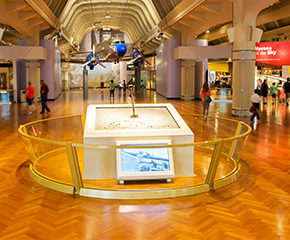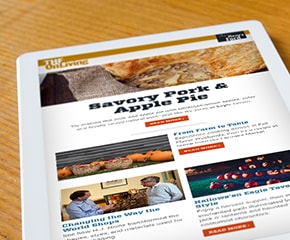
Abraham Lincoln: Getting Re-elected, 1864
10 artifacts in this set
This expert set is brought to you by:
The staff at The Henry Ford
Abraham Lincoln Campaign Badge, 1864
Badge
The possessor of this small token supported Abraham Lincoln for president in 1864. Trinkets, such as this one, reminded American citizens why they backed certain parties and candidates. Most tokens were just that -- small coins carried around in purses or pockets. This token, however, could be attached to a ribbon or pin and became an outward display of support for the Republican candidate.
Ohio National Union Party Ticket for the 1864 Presidential Election
Ballot
After a gloomy summer of Union defeats and casualty lists, President Lincoln's re-election hopes seemed slim. But finally, several Union victories gave him the needed public support to win the 1864 election by a landslide. The phrase "Rally round the Flag, Boys!" was part of a Lincoln-Johnson campaign song modified from the 1862 patriotic song, "The Battle Cry of Freedom."
1864 Presidential Election Ballot with Union Party Ticket for Dearborn, Michigan
Ballot
After a gloomy summer of Union defeats and casualty lists, President Lincoln's re-election hopes seemed slim. But finally, several Union victories provided the public support to win the 1864 election by a landslide. The phrase "Rally 'round the Flag, boys" was part of a Lincoln-Johnson campaign song modified from the 1862 patriotic song, "The Battle Cry of Freedom."
National Union Party Presidential Election Campaign Card, 1864
Card (Information artifact)
In 1864, incumbent President Lincoln and former Democrat Andrew Johnson ran on the National Union Party ticket--so named to attract War Democrats and Border State Unionists who would not vote Republican. After a gloomy summer of Union defeats and casualty lists, Lincoln's re-election hopes seemed slim. But, finally, several Union victories gave him enough support to win the election.
National Union Party Election Day Handbill, November 8, 1864
Handbill
In 1864, incumbent President Lincoln and former Democrat Andrew Johnson ran on the National Union Party ticket--so named to attract War Democrats and Border State Unionists who would not vote Republican. After a gloomy summer of Union defeats and casualty lists, Lincoln's re-election hopes seemed slim. But, finally, several Union victories gave him enough support to win the election.
McClellan Presidential Campaign Lantern, 1864
Paper lantern
Late-nineteenth-century political parties rallied their supporters by holding torchlight parades. In the evening, marchers lit up the street carrying torches, lamps and lanterns. Inexpensive paper lanterns glowed with the image or name of the party's candidate or other patriotic imagery. In 1864, backers of General George McClellan used lanterns like this to call for the defeat of the "Old Joker," President Abraham Lincoln.
Presidential Campaign Lantern, 1864-1868
Paper lantern
Late-nineteenth-century political parties rallied their supporters by holding torchlight parades. In the evening, marchers lit up the street carrying torches, lamps and lanterns. Inexpensive paper lanterns glowed with the image or name of the party's candidate or other patriotic imagery. Backers of the Union would proudly carry a lantern like this at parades during and just after the Civil War.
"Grand National Union Party for 1864"
Print (Visual work)
In 1864, incumbent President Lincoln and former Democrat Andrew Johnson ran on the National Union Party ticket--so named to attract War Democrats and Border State Unionists who would not vote Republican. After a gloomy summer of Union defeats and casualty lists, Lincoln's re-election hopes seemed slim. But, finally, several Union victories gave him enough support to win the election.
Abraham Lincoln Campaign Stickpin, 1864
Stickpin
After a gloomy summer of Union defeats and casualty lists, President Lincoln's re-election hopes seemed slim. But, finally, several Union victories gave him the needed public support to win the 1864 election by a landslide. This unusual campaign stickpin holds a ferrotype (or tintype) portrait of Abraham Lincoln.
Abraham Lincoln and Andrew Johnson Campaign Torch, 1864
Torch (Lighting device)
Late-nineteenth-century political parties rallied their supporters by holding torchlight parades. In the evening, marchers lit up the street carrying torches, lamps and lanterns. Many of these political lanterns glowed with slogans and patriotic symbols. Supporters of President Lincoln and the Union would have carried this torch during the 1864 campaign.


